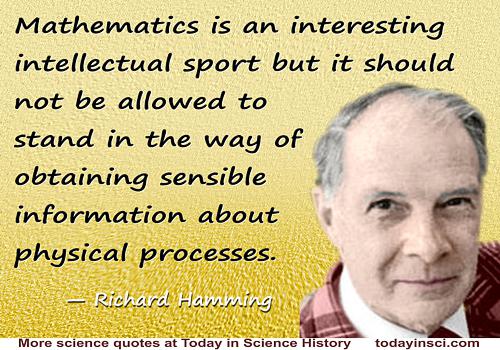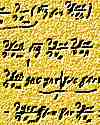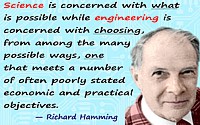 (source)
(source)
|
Richard Hamming
(11 Feb 1915 - 7 Jan 1998)
American computer scientist and mathematician who invented Hamming codes - computer error-detecting and correcting codes.
|
Richard Hamming - “Mathematics is an interesting intellectual sport”
Illustrated Quote - Medium (500 x 350 px)
More Richard Hamming quotes on science >>
Context of Hamming's quote, “Mathematics is an interesting intellectual sport”
Although several quotations books attribute this quote to Richard Hamming, they do not give a specific printed source. This is perplexing, since such a statement can be verbally passed down through his colleagues and students, and so indeed may have been spoken by Hamming on one or many occasions.
However, it is incorporated as a statement in the Preface to a book by two physicists Marvin L. Goldberger and chemical engineer Kenneth M. Watson in Collision Theory (1964, 2004), iii, who describe their approach as writers:
Since it is our purpose to talk about problems of real physical interest, we make no pretense of strict mathematical rigor. Instead we have substituted mathematical reasonableness and physical rigor. Mathematics is an interesting intellectual sport, but it should not be allowed to stand in the way of obtaining sensible information about physical processes.
Some time later, a passing reference to this quote as having been written by two unnamed “respected practioners of quantum mechanics” is made 25 years earlier by Andrew Lenard in a book review in& Bulletin of the American Mathematical Society (May 1980), 2, No. 3, 541. Indeed, Goldberger and Watson had collaborated in observation of “entangled” quantum mechanical systems, and their book title referred to collisions of quantum mechanical systems.
By 1988, the quote was attributed, without specific citation, to Hamming in a book by Nick J. Rose, Mathematical Maxims and Minims.
Meanwhile, Hamming's book, Numerical Methods for Scientists and Engineers (1962), appears together with Goldberger and Watson Collision Theory (1964), in the references listed in two physics books (Baxter H. Armstrong, Ralph W. Nicholls Emission, Absorption, and Transfer of Radiation in Heated Atmospheres (1972), 275; also Gordon W. F. Drake, Atomic, Molecular, and Optical Physics Handbook (1996), 119.) This brings to mind some unfounded speculation that the research of Goldberger and Watson may have brought them together with the data processing skills of Richard Hamming at some point. Who originated the quote and who may have passed it along remains obscure.
So, that is as much as Webmaster has determined to this point. If anyone has more information to clarify the origin of this quote, please contact Webmaster.
- Science Quotes by Richard Hamming.
- 11 Feb - short biography, births, deaths and events on date of Hamming's birth.
- Richard Hamming - context of quote “Engineering is concerned with choosing, from among the many possible ways” - Medium image (500 x 350 px)
- Richard Hamming - context of quote “Engineering is concerned with choosing, from among the many possible ways” - Large image (800 x 600 px)
- Richard Hamming - context of quote “Mathematics is an interesting intellectual sport” - Large image (800 x 600 px)









